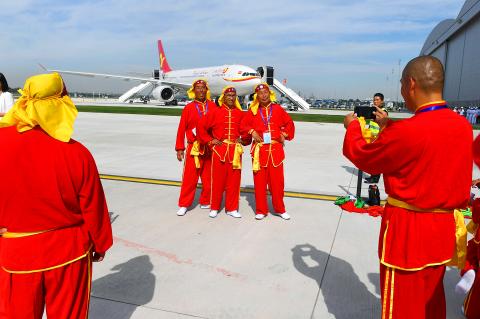Airbus SE yesterday inaugurated its first completion center for large aircraft in China, a new asset for the European manufacturer in heated competition with US rival Boeing Co.
China is one of the Western manufacturers’ key battlegrounds, with its travelers taking to the skies in ever-growing numbers.
In Tianjin, a port city 150km from Beijing, Airbus already has an assembly line for the single-aisle aircraft A319 and A320, the first of its kind outside Europe.

Photo: AFP
Now the same site hosts a completion center for long-haul A330 and its first aircraft was delivered to the local company Tianjin Airlines yesterday, accompanied by the playing of cymbals and banging of drums.
“This is the perfect illustration of mutual trust” and “our willingness to embark on a new stage in the Franco-Chinese relationship,” said French Minister of State for Economy and Finance Benjamin Griveaux, the first member of French President Emmanuel Macron’s government to visit China.
The 200 million euro (US$240 million) facility will receive A330s assembled in France and will prepare the cabins and apply exterior painting. Two aircraft will be delivered every month.
The A330, operated by nine Chinese airlines, is the most popular wide-body aircraft in the country.
“The inauguration of our [center] in Tianjin, together with the first of many deliveries, marks a new milestone for Airbus’ international footprint,” Airbus chief operating officer Fabrice Bregier said at one of the site’s giant halls alongside leaders of state-owned Aviation Industry Corp of China (中國航空工業), the European firm’s Chinese partner.
The majority of Airbus orders in China remain its A320 single-aisle jetliner. However, with about 200 A330s in the country’s skies, the aircraft manufacturer also controls 61 percent of the long-haul market.
According to the company, China will need about 6,000 airliners over the next two decades, and its demand for large carriers will be boosted by the explosion of Chinese passenger traffic abroad that is increasing at 14 percent per year, Airbus China president Eric Chen (陳菊明) said.
Having doubled its market share in the space of a decade, Airbus is now on par with Boeing in China, but the US aircraft maker does not intend to be left behind. Next year it will open its own finishing center for the medium-haul B737 in China.
Chinese state aircraft manufacturer Commercial Aircraft Corp of China Ltd (中國商飛) intends to jostle the Airbus-Boeing duopoly with its medium-haul C919, which made its maiden flight in May.

With an approval rating of just two percent, Peruvian President Dina Boluarte might be the world’s most unpopular leader, according to pollsters. Protests greeted her rise to power 29 months ago, and have marked her entire term — joined by assorted scandals, investigations, controversies and a surge in gang violence. The 63-year-old is the target of a dozen probes, including for her alleged failure to declare gifts of luxury jewels and watches, a scandal inevitably dubbed “Rolexgate.” She is also under the microscope for a two-week undeclared absence for nose surgery — which she insists was medical, not cosmetic — and is

CAUTIOUS RECOVERY: While the manufacturing sector returned to growth amid the US-China trade truce, firms remain wary as uncertainty clouds the outlook, the CIER said The local manufacturing sector returned to expansion last month, as the official purchasing managers’ index (PMI) rose 2.1 points to 51.0, driven by a temporary easing in US-China trade tensions, the Chung-Hua Institution for Economic Research (CIER, 中華經濟研究院) said yesterday. The PMI gauges the health of the manufacturing industry, with readings above 50 indicating expansion and those below 50 signaling contraction. “Firms are not as pessimistic as they were in April, but they remain far from optimistic,” CIER president Lien Hsien-ming (連賢明) said at a news conference. The full impact of US tariff decisions is unlikely to become clear until later this month

GROWING CONCERN: Some senior Trump administration officials opposed the UAE expansion over fears that another TSMC project could jeopardize its US investment Taiwan Semiconductor Manufacturing Co (TSMC, 台積電) is evaluating building an advanced production facility in the United Arab Emirates (UAE) and has discussed the possibility with officials in US President Donald Trump’s administration, people familiar with the matter said, in a potentially major bet on the Middle East that would only come to fruition with Washington’s approval. The company has had multiple meetings in the past few months with US Special Envoy to the Middle East Steve Witkoff and officials from MGX, an influential investment vehicle overseen by the UAE president’s brother, the people said. The conversations are a continuation of talks that

CHIP DUTIES: TSMC said it voiced its concerns to Washington about tariffs, telling the US commerce department that it wants ‘fair treatment’ to protect its competitiveness Taiwan Semiconductor Manufacturing Co (TSMC, 台積電) yesterday reiterated robust business prospects for this year as strong artificial intelligence (AI) chip demand from Nvidia Corp and other customers would absorb the impacts of US tariffs. “The impact of tariffs would be indirect, as the custom tax is the importers’ responsibility, not the exporters,” TSMC chairman and chief executive officer C.C. Wei (魏哲家) said at the chipmaker’s annual shareholders’ meeting in Hsinchu City. TSMC’s business could be affected if people become reluctant to buy electronics due to inflated prices, Wei said. In addition, the chipmaker has voiced its concern to the US Department of Commerce